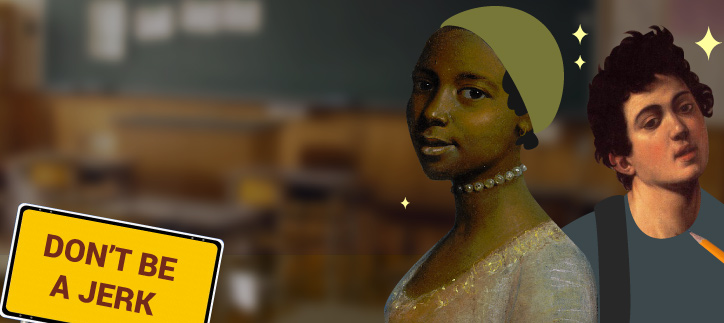Looking for more PBIS resources? Check out all of our Teacher Guides and Online Courses here.
Our teaching guides are reliable. They're updated to meet our ever-increasing standards of education. They're available in more subject areas than you can count. They're accessible online 24/7.* And we don't have to eat, sleep, or do anything else that sometimes affects reliability. (No, we're not waiting for the singularity so we can take over the world. Why do you ask?)
While we can't make your students into supreme robot overloads (oops, did we actually type that?), we do have a solid reliable lesson in—what else?—reliability.
In this guide, you will find
- scripted lesson plans on reliability related to various social groups, like adults, family, and the classroom.
- an activity that emphasizes trust, security, and friendship.
- an assignment about keeping promises. (Pinky swear optional.)
*Of course we apologize for any technical difficulties beyond our control that prevents your access to our reliable teaching guide. We're not in total control of the entire internet… yet.
DAY 1: RELIABILITY: YOURSELF
Introduction
Reliability is one of those words that triggers a "the teacher is lecturing us now" warning in students' heads. Seriously, if you watch closely you can actually see that moment their brains check out. But what they don't realize too often is how much they appreciate reliability when it directly affects them. Today's class will focus on the effects of reliability and emphasize self-reliance as a building block to becoming reliable to others.
Before you get started, here's a video you can show to your class.
Key Skills and Learning Objectives
- To understand what being reliable means
- To get to know the long-term effects of reliability
- To practice relying on yourself for a week
Homework
- Yesterday: Zilch.
- Today: Complete your reliability hand-out and start practicing.
THAT SECURITY FEELING
Materials Needed: Construction paper strips (approximately 8x2"), preferably in different colors, four per student. Felt pens. Glue sticks. Tacks to hang up the majestic paper chain we will be making (and maybe a stapler for shoddy glue jobs...).
Estimated Time to Complete: 50 minutes
Did you ever fall into a pit of boiling lava and need your friend to pull you out, so your friend goes downstairs to get a fire-resistant rope, but by the time you're almost a crisp skeleton and decide to drag your own bones out of there yourself, you find your friend downstairs eating cookies with your mom—ugh—and so you glare at your friend with rage while the last bits of lava drip from your charred elbows, making not-too-subtle sizzling sounds on the rug?
Well, that's what we call an unreliable friend. And a ruined carpet.
We notice reliability the most when it affects us. For example, you told your mom you'd do the dishes tonight. Later, she finds that they're not done and you're playing video games.
Big deal to you? Maybe not. To her? Uh, yup.
So why is reliability important if maybe you don't care about doing the dishes? Or finishing your homework? Or buying a brother's day gift?
In front of you, you have four "strips." On the first one, I want you to write in big letters "RELIABILITY." Now, I want you to pair up and discuss what you think reliability is and what you think it leads to. For example, if I did the dishes every time my parents asked me to, what would that make me?
Share your findings with a neighboring couple. Then, write "TRUST" on the next strip. What does it mean to trust someone? Discuss with your group of four. What does trust lead to?
Hopefully, some of you got close to the idea of security in your discussions. Trust leads to security; therefore, on your third strip, write the word "SECURITY." What does security lead to in relationships outside your family? Hint: think of your best friends.
On the fourth strip, write the word "FRIENDSHIP." Who are your best friends? Would you describe them as reliable? Funny how this quality is usually a strong component of best friend material...
Take your strips and glue one into a loop. Glue the other strips into attaching loops to make a chain. Now, attach your chain to your neighbor's chain. I'll be hanging this up around our class this week as a reminder of how reliability builds trust, security, and friendship. [Hint: it would be good if the students glued their strips with the words facing out.]
After you're finished with the chain, get into groups of four or five, pick one of the following scenarios, and come up with three scenes. The first will be how an unreliable person would react, the second will be how a reliable person would act, and the third will demonstrate how a reliable person who does more than is asked for would act. Pick from the following scenarios:
- Your elderly neighbors need someone to walk their dog every morning.
- Your mom needs you to dust the house once a week.
- You need to practice basketball every day to make the team.
- Your baby sister needs to be picked up after kindergarten.
- You need to complete your homework every night in order to do well at school.
- Your grandma wants you to bake a rando-berry pie for her eleventy-first birthday.
[Give the students ten minutes to make their scenes, then 5 minutes each to perform them. Discuss highlights with the class.]
[Once the skits are complete, distribute the handout.] Make a list of things you know you should do this week. It might be a daily task like flossing your teeth, eating a healthy breakfast, or shampooing the cat, but it could also be a task that takes a week to complete… like doing your homework every night, or babysitting your sister after school, or shampooing the cat. Make your list. Make it huge.
Once you're done with your list, close your eyes. Open them again—this time, with the guise of reality. You could promise yourself that you would do all of these things, and you might fail and end up being disappointed in yourself. Pick the things you think you could realistically, absolutely for certain, indubitably, piece-o'-cake accomplish. Circle them. Write one on the handout.
Below your accomplish-able goal, write how much time you need to complete it. An hour? A day? Now double that time. If you're going to clean your room in an hour, give yourself two. Things often take us longer than we think they do. Your homework is to complete your task.
HOMEWORK
Complete your accomplish-able task to practice self-reliance.
DISCUSSION AND ESSAY QUESTIONS
- Has anyone ever let you down? How did that make you feel?
- What are the top five qualities you find important in a friendship?
- Have you ever had anyone go above and beyond your expectations? Describe.
- Why do you think it's important to be reliable? Give three reasons and explain.
- When do you feel the most secure?
- What do you rely on in your life? What would be the hardest thing to lose?
- Write an essay about the most reliable person in your life. How do you think reliability affected the course of their life and the people they love?
- What is trust to you?
- What's the best feedback you've ever received? How did it affect you?
- If you could give anyone tips on how to become more reliable, what would you say?



